Penelope Choi
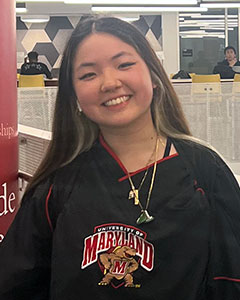 In her high school engineering courses, Penelope Choi was often the only Asian American—and girl—in the room. For her college experience, she wanted to be part of a more diverse community. She found it at Maryland Engineering, which has been awarded the bronze level of achievement from the American Society for Engineering Education’s Diversity Recognition Program. For Choi, who is first-generation American, representation isn’t about numbers, but about celebrating shared history and culture. “At the Clark School, I have a large APIDA community for the first time,” says the fire protection engineering junior.
In her high school engineering courses, Penelope Choi was often the only Asian American—and girl—in the room. For her college experience, she wanted to be part of a more diverse community. She found it at Maryland Engineering, which has been awarded the bronze level of achievement from the American Society for Engineering Education’s Diversity Recognition Program. For Choi, who is first-generation American, representation isn’t about numbers, but about celebrating shared history and culture. “At the Clark School, I have a large APIDA community for the first time,” says the fire protection engineering junior.
In addition to her studies, Choi is involved in multiple engineering organizations including Theta Tau, a professional co-ed engineering fraternity; the Society of Fire Protection Engineers; and the Society of Asian Scientists and Engineers. She’s also a resident assistant and student ambassador for the Department of Fire Protection Engineering, participating in outreach and recruitment activities. In this way, she says she can pay her formative experiences forward to the next generation of Terps: “When I’m in a community I identify with, I excel. Being able to create that kind of community for others on campus is really valuable.”
Her advice for current and future students? “There’s a place for you here. Make the most of everything Maryland has to offer.”
Back to top ↑
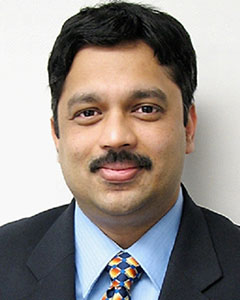 Srinivasa R. Raghavan
Srinivasa R. Raghavan
Professor Srinivasa R. Raghavan, who joined the Clark School faculty in 2001, says he’s witnessed increasing diversity and a more “cosmopolitan” environment—both on and off campus. For the India native, diversity is about more than demographics: “I’ve had people from 20 different countries in my research group,” he says, grateful for the creative edge afforded by the different perspectives and skills of his lab members and collaborators.
In addition to teaching and advising students, the professor of chemical and biomolecular engineering runs the Complex Fluids and Nanomaterials Group with 16 current students. The lab focuses on creating and inventing new materials that can be translated to practical use. Several of the lab’s research areas have health care applications: drug delivery activated by electric fields or radiation, ingestible capsules that modulate gut health, and materials for bleeding management. To date, more than 20 patents have been filed based on inventions in his lab.
His biggest accomplishment? Seeing an innovative product—Rapid-Seal® made by Medcura Inc., started by Raghavan’s former student Matthew Dowling ’10—go from a discovery in the lab to a consumer product available on the shelves of pharmacies and through Amazon. Raghavan takes pride in seeing his former students’ success, but takes no equity in their businesses: “I’d rather be working on the next invention,” he says.
Back to top ↑
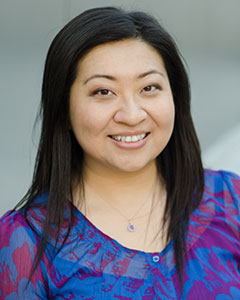 Huan “Mumu” Xu
Huan “Mumu” Xu
Huan “Mumu” Xu, associate professor of aerospace engineering, has had a very busy few years. Between teaching and mentoring her students during the COVID-19 pandemic, publishing papers, having her first child, and becoming tenured, Xu considers the balance of work and home life she’s struck a major accomplishment. Having joined the Clark School in 2013, she’s glad she’s done it here: “Maryland has provided me the place where I’ve come into my own,” she says.
Xu’s family emigrated from China when she was a toddler; she grew up in southern California, where her father Shizhong Xu is a distinguished professor and geneticist in the Department of Botany and Plant Sciences at the University of California, Riverside. From her parents she developed a strong work ethic, but it took time to fully embrace her identity because, Xu says, she didn’t see people in STEM that looked like her. “There wasn’t even a Barbie that looked like me,” she comments. That’s why representation matters greatly to Xu: “It’s one of the first things I think about when recruiting students,” she says. “Having a balance of backgrounds in the lab makes the work better.”
Xu’s research focuses on autonomous systems, with many applications related to drones of all sizes. She teaches undergraduate and graduate courses and advises the undergraduate drone racing team. In the lab, she works closely with a small team of students, mentoring them through the graduate school trajectory. “When they’re able to teach me about their project, it’s always a great feeling,” she says.
Back to top ↑
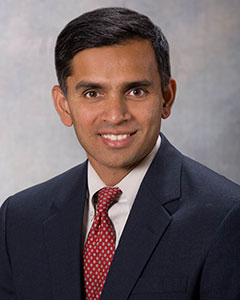 Hari Gopalkrishnan ’89
Hari Gopalkrishnan ’89
Electrical engineering alum Hari Gopalkrishnan ’89 leads Bank of America’s Retail, Preferred, Small Business & Wealth Management Technology team, providing integrated technology solutions to the company’s approximately 68 million consumer and small business relationships and for wealth management clients. Additionally, he serves as Bank of America’s market sponsor for Richmond, Virginia. A first-generation American who came to the U.S. from India at 15, Gopalkrishnan is a champion for diversity and inclusion at Bank of America. He serves as co-executive sponsor for the enterprise Asian Leadership Network, fostering understanding of unique challenges and biases APIDA heritage people may face. His recent work includes promoting conversations around mental health—a sometimes stigmatized topic in the community—and working with other demographic leadership groups to drive equity across the organization. In 2022, Gopalkrishnan was appointed to the national board of directors for Girls Who Code, which aims to close the gender gap in technology.
He credits his Maryland experience for teaching him that education isn’t about regurgitating facts and numbers: “It’s about critical thinking and developing intellectual curiosity and empathy. It’s what made me a well-rounded person and a better engineer,” Gopalkrishnan says.
He and his wife, Sonali Gopalkrishnan ’91, established in 2019 the Sonali and Hari Scholarship for students in the Fostering Terps Success Program to assist those who are or were in foster care, who are unhoused or at risk of becoming unhoused, and who are without a supportive family system. The proud alums also established the Sonali and Hari Student Crisis Fund to provide students in need with emergency financial assistance. Through their generosity, they aim to increase access to education in order to foster equity, opportunity, and innovation.
Back to top ↑
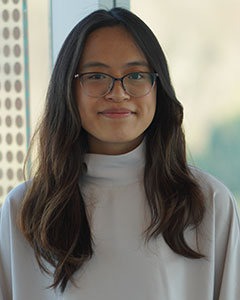 Alexandra (AJ) Saquilayan
Alexandra (AJ) Saquilayan
Civil engineering student Alexandra (AJ) Saquilayan was inspired to study engineering when she was a student at Eastern Technical High School in Baltimore County. Coming to Maryland as only the second in her family to attend college in America, she says she at times felt lost. Saquilayan credits the other members of Chi Epsilon’s executive board for giving her the confidence to harness her unique perspective: “Being a minority and a woman in engineering has given me the empathy I need in positions of leadership. It makes it easier for me to connect.”
Pursuing her passions for excellence, advocacy, and community education, she has served as a ClarkLEADER and vice president of the UMD chapter of Chi Epsilon, the National Civil Engineering Honor Society. She’s taken on leadership roles with the Filipino Cultural Association and the Asian American Student Union (AASU). Over the last two years, the AASU revived a high school program for local BIPOC-identifying youth called the Yuri Kochiyama High School Leadership Program, named for a Japanese American activist. It provides opportunities for high schoolers to learn about APIDA heritage, strengthen their sense of identity, and build community. “The program was my proudest accomplishment—and contribution to the APIDA community,” she says.
In May 2023, Saquilayan will graduate with a B.S. in civil engineering and a minor in Asian American Studies, after which she will join Whitney Bailey Cox & Magnani, LLC as a design engineer in their Marine-Industrial Department and take the Fundamentals of Engineering exam.
Back to top ↑
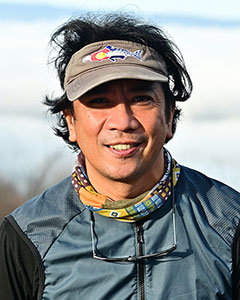 Alan “Al” Santos ’96
Alan “Al” Santos ’96
Alan “Al” Santos ’96 is director of undergraduate student services in the Department of Civil and Environmental Engineering. In his 28th year in the department, he has helped thousands of Maryland Engineering students, with 200 assigned to him this year alone. Working as an adviser and program manager, the end goal is to provide a place where students feel comfortable, so they can be successful—with enough hard work.
Hard work is something Santos knows well. His mom left the Philippines in 1980 for the U.S. with Santos and his two siblings; she cleaned houses and eventually built her own business. Santos started out as a student worker at UMD while studying in the School of Public Health, and climbed his way up. Today, his daughter majors in fire protection engineering at the Clark School, and his son will become a mechanical engineering major at Maryland in the fall.
Honored with advising awards from both the University System of Maryland and the Clark School, he is vital to the department and committed to his students, many of whom stay in touch. “I’m proud of the students I’ve graduated,” he says. He tells his current students as much, too, knowing a little praise can make a big difference. He’s felt a backlash in recent years against the APIDA community, and worries about student mental health. But he keeps a positive outlook: “We have a lot to contribute,” he says of the APIDA community. “We [in the U.S.] are a country of immigrants, and that’s something we should all celebrate.”
Back to top ↑
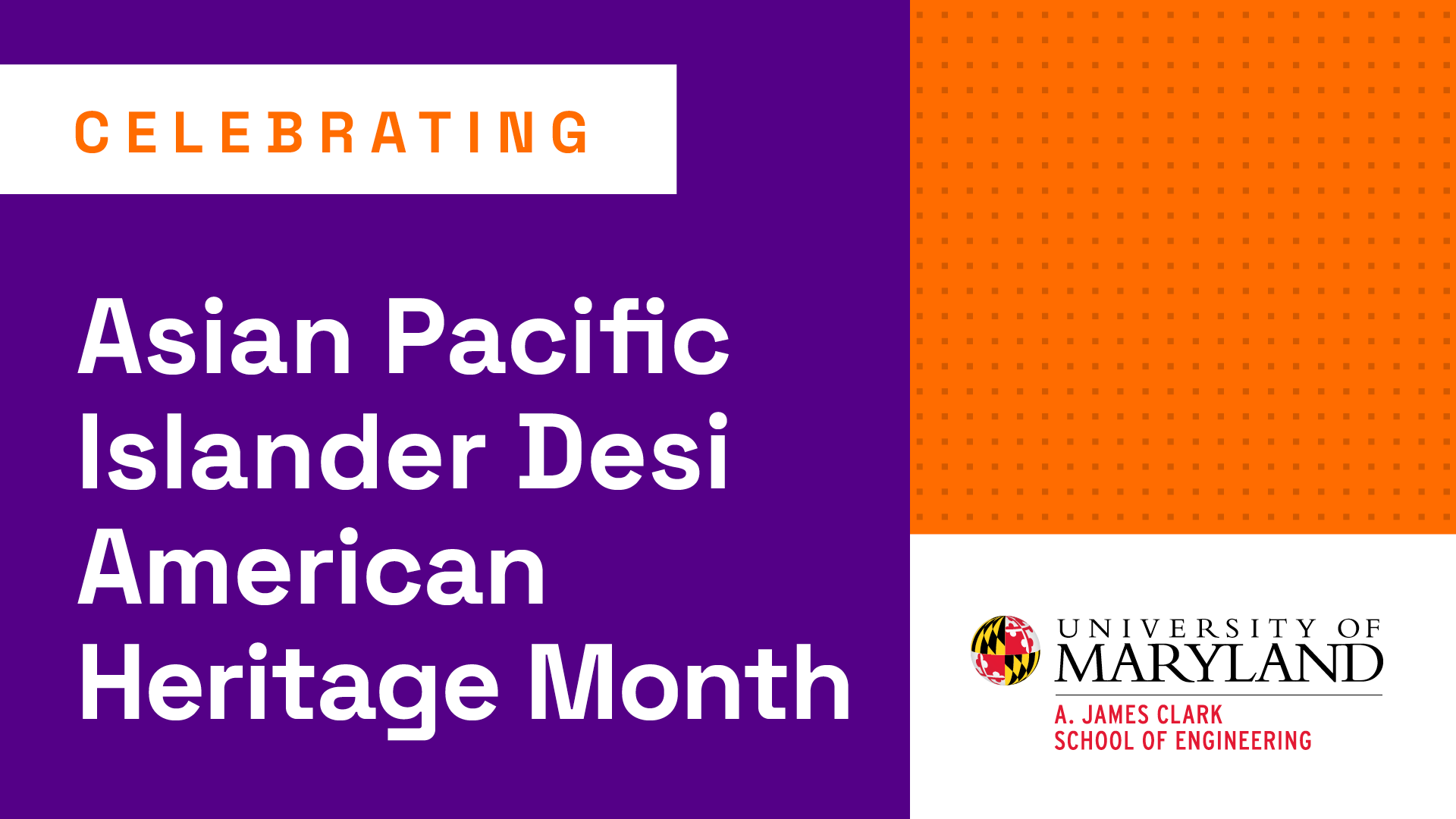
 In her high school engineering courses, Penelope Choi was often the only Asian American—and girl—in the room. For her college experience, she wanted to be part of a more diverse community. She found it at Maryland Engineering, which has been awarded the bronze level of achievement from the American Society for Engineering Education’s
In her high school engineering courses, Penelope Choi was often the only Asian American—and girl—in the room. For her college experience, she wanted to be part of a more diverse community. She found it at Maryland Engineering, which has been awarded the bronze level of achievement from the American Society for Engineering Education’s 



